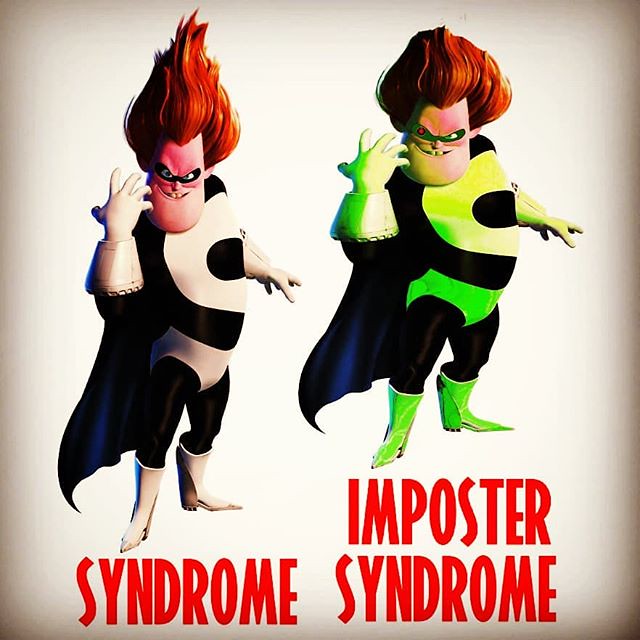How the “Imposter Syndrome” can be good for your career.

By Ramzi Marjaba
I walked into my first one-on-one meeting with my first manager two weeks into my job. I still remember him complimenting me, saying that I “exude confidence”. That came as a surprise as I was kinda worried I’d get fired since I still had no idea what I was doing there, what the job was, and what are these acronyms that all my teammates keep throwing around. I did what everyone else would have done in that situation. I smiled and said thank you.
I spent 2 years on that job. As soon as I got comfortable, I moved to a more senior role in Network Design. Before I accepted that position, I had big doubts. I didn’t know anything about network design. How can I go meet customers and tell that what they should do with the millions of dollars worth of equipment they were just forced to buy by their upper management? I also spent 2 years being a Network Designer.
I then moved to Sales Engineering, had the same feeling. I had the same feeling when I started the podcast and this site. Who am I and why should people listen? The difference now is that I know what that feeling is. The “Impostor Syndrome” I believe it is called, and I’m here to tell you that the Imposter Syndrome has pushed my career forward, not held me back.

Let’s start by defining what Imposter Syndrome is. According to the most trusted source, Google, Imposter Syndrome is the persistent inability to believe that one’s success is deserved or has been legitimately achieved as a result of one’s own efforts or skills.
While I was researching to write this, I found many articles that talked about how one can overcome the Imposter Syndrome, or why it’s holding them back. Everything had a negative connotation. In my mind, I believe I owe all my success to the Imposter syndrome. Keep in mind I’m not a famous movie star or a Nobel prize winner. I’m a husband and father who uses Sales Engineering to provide for his family and have fun while doing so. That seems to be my definition of successful. I also help a lot of other Sales Engineers and aspiring Sales Engineers to get better jobs and be successful like me through these blogs and podcasts.
In one particular blog post (linked here), they say the following, and I am paraphrasing, If you think you are not qualified, flip it and say you are qualified. Or if you think that if you make a mistake, you will get fired. They say to flip that and say that it’s ok to make mistakes. No one is perfect.
The question that I have here is why does one think that they are not qualified. Could there be merit to that assumption? And just flipping that without considering why you think you are not qualified could lead to the feeling of entitlement. It is similar to telling people they can be anything they want, and forgetting to say if they work at it. I had this feeling all the time. I’m not qualified to be a support engineer, or a Network Design Engineer, and a Sales Engineer, or someone who helps other Sales Engineers. I didn’t just look in a mirror and say no I am qualified. I tried to understand why I’m not qualified. Oh, I don’t know all these acronyms? Well, it’s time to study them so I can speak the same language as my colleagues. Oh, I don’t know anything about network design? Maybe I should go review some of the design documents that my colleagues presented to their customers. I don’t know anything about sales? Then I will read every sales book, listen to every podcast I can find about the subject.
Is it uncomfortable? Yes. Am I in a constant state of anxiety? Possibly, up until I do some amazing feat that I never thought possible like getting customers who hate my product to at least like me and want to work with me. I was stressed, but stress is not always a bad thing. If you don’t believe me, check out this Ted Talk
I was really uncomfortable receiving that comment from my manager. I exude confidence on the outside, but inside, I’m shaking like a leaf. My imposter syndrome said that I didn’t belong there, even though everybody who started on that team after me was in the same boat. I didn’t know that, and it leads me to want to work harder and continues to do so.
Also, there’s the notion that it’s ok to make mistakes. That may be true, but sometimes the smallest mistakes can have really bad consequences. For example, if I make a typo in a customer proposal that no one catches, the customer may receive the wrong product or the wrong quantity of products. Is it a small mistake? Yes. Is it an insignificant consequence? No! I just cost my company money and time, the customer lost confidence in me and he now needs to ship back a product he never purchased. So not all mistakes are created equal, and if we go in with the mindset that it’s ok to make mistakes, we’re already at a disadvantage. We are choosing to be mediocre.
All this to say use the “Imposter syndrome” to your benefit. It is there to guide you so you can improve. Listen to it, then face it head-on.
Stay in the loop
Subscribe to get our latest content by email.
Success! Now check your email to confirm your subscription.

This Post Has One Comment
Pingback: Sales Engineering Skills that No One Talks About | We The Sales Engineers